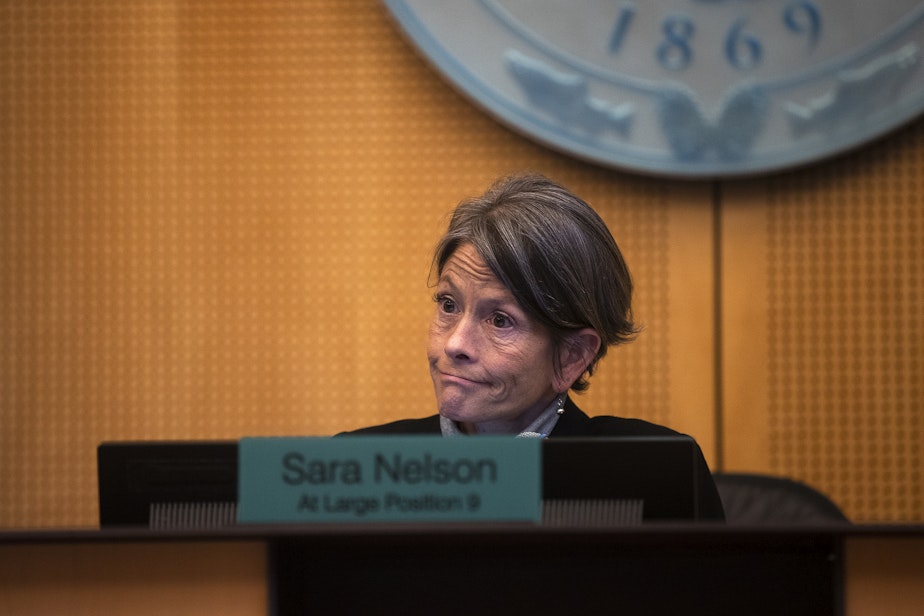Tensions percolate among the Seattle City Council’s moderate majority

People who pay attention to Seattle politics know the City Council experienced a sea change last year when moderates took control of a previously progressive-leaning council. But it's not all Seattle Nice.
New reporting by Seattle Times City Hall reporter David Kroman suggests there are tensions under the surface of that moderate voting bloc that are emerging publicly. He told KUOW’s Kim Malcolm about what he's seeing.
This interview has been edited for clarity.
Kim Malcolm: You start with a measure Council President Sara Nelson pushed recently to develop housing in the SODO area. She got it passed, but you wrote she also “kicked a political hornet's nest” to get it done. What happened?
David Kroman: So, this is a bill to allow housing on the edges of Seattle SODO neighborhood. I say that she kicked a political hornet's nest because it really unearthed this tension in Seattle between industry and housing, both issues that really bring out a lot of passions. Particularly for the Port of Seattle, this issue was seen as a betrayal of past agreements and it really kind of brought out a lot of really intense passions from people outside of City Hall, but also among councilmembers.
But, as I talk about in the piece, Council President Nelson is somebody who, when she believes something is the right thing to do, kind of goes after that fiercely, and sometimes that leaves people in the wake, or frustrated, or angry about it, but she thought that this housing bill was the right thing to do, and so despite kind of what everybody was feeling about it and all the passions that came as a result, she pushed forward with it, and like you said, eventually got it passed.
Just to focus on Nelson for a moment, you write that she was eager to become president and reverse the council's previous progressive stances. One supporter you talked to said she was “not there to be liked.” How would you describe her management style? Does it differ from previous council presidents?
Sponsored
Yes, I think it very much does differ from past council presidents. Despite the kind of lofty title, council president has often been a largely administrative role. That person is responsible for committee assignments, scheduling those committees, kind of deciding where legislation goes. A lot of times we see the council president not really do any big legislation. I think of Council President Deborah Juarez. She hardly did any sort of her own legislation, because she was focused on the tasks of just making the operations of City Council run.
I think in Council President Nelson's case, though, there was this kind of sea change of new members joining the body, and that benefited Nelson, because she had been in the minority on this progressive council. Her voice had not found any way to break through the progressive body that she'd been on before. So, when this new slate of moderate council people who were much more in line with her way of thinking came on board, she saw the opportunity to be the face of that, and I think saw the council presidency as the best way to do that.
Who supports her leadership on the council, and who are some of her detractors?
I think a lot of the new members who came in have gone on the record saying that they think she's doing a good job. Councilmembers Maritza Rivera and Rob Saka have both talked about how, yes, she has strong passion, she has strong ideology, and that's what this council needs, and she's doing a good job of pushing us in that direction.
The through line, I would say, of people who are frustrated with her are that they are usually on the opposite side of an issue of her. They feel like, more than just a policy disagreement, she is using her position to bend the council toward supporting her policy positions. For some independently elected people on that body, it is a frustrating thing to feel like their priorities might not get a fair shake.
Sponsored
Looking ahead, there are some major issues coming at us: managing the city's growth, of course, and the budget gap. How do you expect this fracturing among the moderates to play out?
When this group of councilmembers was elected, the assumption was that they would all sort of move in a block together and basically be able to pass whatever they want. And when it comes to public safety, I think there's some truth to that. They do seem to be largely in agreement around law enforcement and prosecution of drug-related crimes and things like that.
But when it comes to other issues, particularly around labor or the budget, there is not nearly that kind of unanimity. We've seen fights over whether to add a capital gains tax in Seattle, how to plug the city's budget hole, what growth looks like, that suggests that this council is actually much more nuanced than the sort of uniform slate some people see it as. I think for Council President Nelson, that is going to be a big challenge over the next year, how to herd that body in one direction to solve a lot of these pretty significant issues.
Listen to the interview by clicking the play button above.





